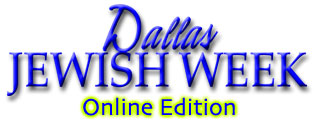| Dallas Jewish Week Menu
|
 |
Getting ready for Rosh Hashanah
Rosh Hashanah is observed on the first and second day of the month of Tishrei. This year (2002), Rosh Hashanah will begin sundown Friday, Sept. 6, ushering in the New Year 5763. Rosh Hashanah is Shabbat and Sunday, Sept. 7 and 8.
Rosh Hashanah means, literally, "head of the year" or "first of the year." Rosh Hashanah is the Jewish New Year (5763).
Rosh Hashanah is celebrated for two days, not only in Chutz La-Aretz (outside of Israel), but also in Eretz Yisroel. The celebration of this Yom Tov is marked with solemnity, as it is on Rosh Hashanah the whole world is judged for the coming year.
Rosh Hashanah begins a 10-day period, known as Aseret Ymay Tshuva (Ten Days of Repentance), or Yomim Nora'im (High Holy days). These 10 days that end with Yom Kippur are a time for Tshuva (repentance), Tefilla (prayer) and Tzedaka (charity). Jews have these 10 days to consider the sins of the last year and repent, and ask Hashem and our fellow man for forgiveness before Yom Kippur. More about this later.
A great deal of time is spent in the synagogue on Yomim Nora'im, praying to Hashem that our sins be forgiven and that we be inscribed in the "Book" of Life.
The Shofar (ram's horn)
The shofar (ram's horn) is blown on Rosh Hashanah. It sounds something like a trumpet. However, unlike a trumpet, the shofar has no mouthpiece. One of the most important Mitzvot of this Yom Tov is hearing the 100 sounds coming from the shofar in the synagogue each day of Rosh Hashanah.
Shofar sounds
There are three different types of shofar sounds:
* Tekiah, a 3-second sustained note;
* Shevarim, three 1-second notes rising in tone,
* Teruah, a series of short, staccato notes extending over a period of about 3 seconds;
There is also a Tekiah Gedolah (literally, "big Tekiah"), the final blast, which lasts longer than the regular Tekiah.
To hear each sound, go to
Ba'al tokay-ah
It is very difficult to blow the shofar. A Ba'al tokay-ah (shofar blower) may spend many hours practicing before Rosh Hashanah.
The Ba'al tokay-ah should be someone who is respected in the community, a person who is well liked and does good deeds. Another person stands next to the Ba'al tokay-ah and calls out the order of the Tekiyot. You are supposed to stand during the Tekiyot, but more important, it is forbidden to talk from the time of the first Bracha (blessing) of the shofar until after the final shofar blasts at the end of Mussaf.
"May you be inscribed and sealed in the book of life for a good year"
The common greeting during this period is L'shanah tovah (for a good year). This is short for L'shanah tovah tikatev v'taihatem (or to women, L'shanah tovah tikatevi v'taihatemi), which means "May you be inscribed and sealed for a good year."
These greetings are used during this period because on Rosh Hashanah the destiny of all mankind is recorded by Hashem in "Books." In these "Books," Hashem writes in our names, writing down who will live and who will die, who will have a good life and who will have a bad life, for the next year. Though these "Books" are written in on Rosh Hashanah, our actions during Aseret Ymay Tshuva (the Ten Days of Repentance), can alter Hashem's decree. The actions that can change the decree are Tshuva (repentance), Tefilla (prayer) and Tzedaka (charity).
It is very important to seek reconciliation with people you may have wronged during the course of the year. The Talmud states that Yom Kippur can only atone for sins between man and Hashem. To atone for sins against another person, you must first seek to reconcile with that person, righting the wrongs you committed against them if possible.
Fun foods
In Judaism, everything has significance, even our food.
* Apples and Honey - On Rosh Hashanah, we dip apples in honey, hoping that the New Year will be as sweet as the taste of these fine foods.
* Challah and Honey - Mmm, you're licking your lips. For some reason, challah dipped in honey tastes so good on Rosh Hashanah. We also have special round challah. Some say it looks like a crown and it is to remind us that G-d is ruler over us. Others say that it is round to remind us of the cycle of the seasons.
* Yehi Ratzon - Before we eat the main course we have the custom to eat certain foods and say special words to G-d to grant us a good year. We especially eat a part of a fish head and ask to be like the head and not the tail. We also eat pomegranate seeds and ask that our good deeds be as many as the pomegranate seeds.
This story was published in the DallasJewishWeek
on: Thursday, August 15, 2002
Copyright 2001, Dallas Jewish Week